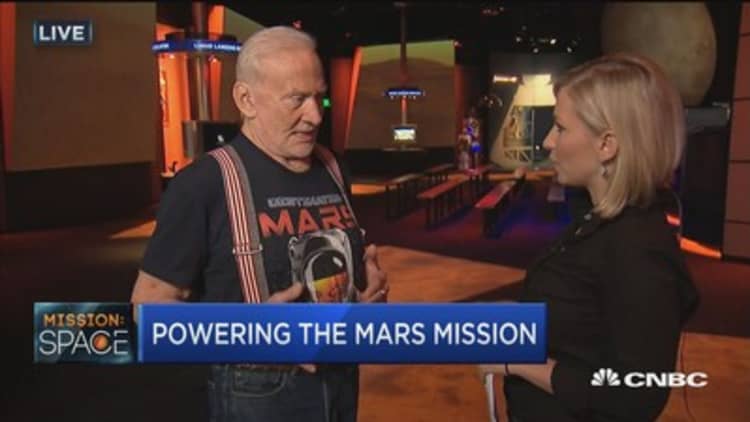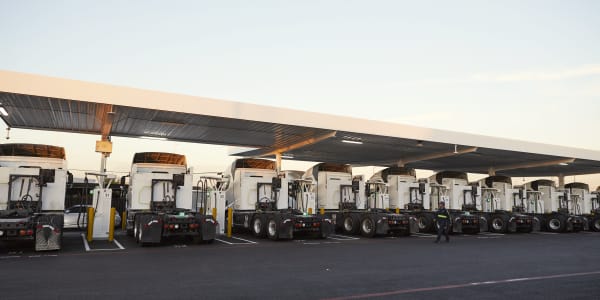TOKYO — Soon after former President Barack Obama announced plans to put Americans on Mars by the 2030s last fall, SpaceX asked permission to launch 4,425 satellites, putting space back on the agenda. With this latest growth, the $335.3 billion space industry will face increased risks from debris orbiting at speeds of up to 42,000 mph. Aiming to maintain order and connectivity, Japan's Astroscale switched from its grand plans for interstellar garbage collection to developing technology for sending "dead" satellites to fiery graves.
The start-up brought in some $7.7 million Series A funding before it secured almost $30 million in Series B investment in March 2016. While yet to launch, the venture has already connected a major Japanese company to the space industry and also holds a contract to put a sports drink on the moon. But there is much more to done; the first mission is to monitor untrackable specks of junk.
Dangers posed by hypervelocity debris, including "dead" satellites, are very real.
In 2009 two satellites collided, completely destroying both craft. The crash involved a decommissioned Russian military satellite and a fully operational U.S. commercial communications satellite.
The accident generated 2,000 items trackable from Earth and tens of thousands smaller pieces unable to be traced. Such accidents have the potential to cause chain reactions of collisions, each which could generate more debris and cause more problems.
Naoko Yamazaki, a former Japan Aerospace Exploration Agency astronaut, quickly discovered the dangers of high-speed junk during her space shuttle mission.
"During my mission, we got at least three debris hits on the space shuttle windows," said Yamazaki, recalling her 2010 International Space Station assignment. While not shattered, the crew photographed the damage so experts on Earth could check if reentry was safe.
200 million pieces of junk
"The global industry revenues from satellite-related activities is in the hundreds of billions of dollars per year," said Steven Tingay, Ph.D., director at Italy's National Institute of Astrophysics in Bologna and a professor at Curtin University in Australia. "Figuring out how to deal with space debris and reduce the risk to these expensive and important assets is major business."
What's being done about debris? NASA's chief scientist for Orbital Debris, Dr. Jer Chyi Liou, said the U.S. Joint Space Operations Center now tracks some 23,000 objects 10 cm or larger orbiting Earth.
"We estimate the number of orbital debris 1 cm and larger is approximately 500,000, and the number of orbital debris 1 mm or larger is in the order of 100,000,000," said Dr. Liou.
No one knows the exact numbers. "There are an estimated 200 million pieces of debris less than 1 cm," according to Dr. Tingay.
We do know space junk is increasing in number. Dead satellites, debris from explosions, experiments and collisions have added to the population of orbiting junk, said William Ailor, a fellow at the Aerospace Corp., a federally funded research and development center for the U.S. Air Force.
Seizing the debris
However, seizing debris is a complex political and legal problem: A 1967 treaty states that objects in space belong to the nations that placed them there. Identifying debris ownership and requesting permission seems very difficult.
"Instead of focusing on existing debris, we've decided to focus on future debris, which comes from the dying satellites," said Astroscale CEO Nobu Okada. "For constellation players with satellite networks, they have to keep their orbit clean. Once their orbit is contaminated, they cannot do business."
Demand for this targeted space service promises to grow exponentially as more companies launch satellite networks.

In November, SpaceX asked authorities for permission to launch 4,425 satellites for a constellation aimed at global coverage for high-speed internet.
Earlier this month, OneWeb — a satellite operator founded by Greg Wyler and backed by Softbank CEO Masayoshi Son — and Intelsat proposed a merger to create a telecommunications empire and bolster internet coverage with more satellites. If finalized, the company would received $1.7 billion from SoftBank's Son for a 39.9 percent stake.
For large projects like these, Okada plans to first gather data on orbiting submillimeter particle density to offer advice on spacecraft shielding needs. Then the goal is to provide specialized services to dispose of decommissioned satellites in the coming constellations.
To do this, Astroscale is now developing the ELSA 1 (which stands for End of Life Service by Astroscale), a craft that will attach itself to decommissioned satellites using a specially created adhesive — patent pending — to drag the terminated machines to burn up on reentry.
Although headquartered in the Southeast Asian start-up hub of Singapore, the venture builds all its technology in a garage factory in a grungy part of Tokyo. Upstairs from the satellite lab, a door is plastered with cutout planets. Inside the meeting room, framed pictures of characters from the popular Japanese comic Space Brothers, especially made for Astroscale, deliver messages cheering on the company.
Figuring out how to deal with space debris and reduce the risk to these expensive and important assets is major business.Dr. Steven Tingaydirector at Italy's National Institute of Astrophysics
Four years after its founding, Astroscale is preparing its first satellite, IDEA OSG 1, built with financial and technical help from OSG, a Japanese precision machine-cutting company.
The craft, scheduled to launch on a Russian rocket in late 2017 or early 2018, is designed to map submillimeter particles in Low Earth Orbit. At an altitude of roughly 800 km, specks of junk will strike impact sensors covering two sides of the satellite, sending the data to Tokyo.
Enterprising partnerships
Okada's venture is also creating opportunities for larger companies. In 2015, OSG sponsored Astroscale's first satellite for an undisclosed amount. The precision-cutting company works with high-performance leaders in aviation and motor sports. It used its expertise to make the IDEA OSG 1 flange ring, a crucial part attaching the craft to the rocket that needs to be light and strong.
The deal was decided before the start-up made headlines across Japan in March 2016 by securing 3.39 billion yen ($30.22 million on Feb. 9) from the nation's two biggest VC funds — Jafco and Innovation Network of Japan, an initiative between the Japanese government and domestic corporations.
"We had the concept, we had the team, we were ready, but we didn't have the funding," said Yasu Yamazaki, Astroscale's former branding manager, of the time he first met OSG.
Things started when Yamazaki was manning a tiny information booth at the 2015 Paris Air Show. There, a fellow countryman noticed him and, thinking he looked hungry, invited him to lunch in the OSG chalet.
Over lunch Yamazaki whipped out his computer and presented the problem of space debris. His audience? Jiro Osawa, grandson of OSG 's founder and the company's managing director of design and product development.
Later, when Yamazaki visited the company's headquarters in Aichi Prefecture, central Japan, a naming deal was suggested. "He's a good salesman," said Osawa, laughing.
A major name across industries, OSG remains little known outside its sectors of operation. The company's clients include big names in aviation and automotive industries, among others. But the company is eyeing potential growth areas.
While still small, Astroscale is already a company with space connections in the United States, Europe and Japan. Through the venture's network, OSG has started work with some in the space sector. Osawa said, "[Astroscale] opened the door for us."
— By Julian Littler, special to CNBC.com







